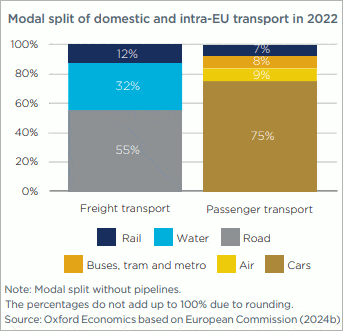
With a total contribution of €247 billion to the economy
and 3.1 million jobs, rail offers a
of the most significant economic impacts among all media
while maintaining the lowest transport footprint
carbon. This is underlined by a study on the incidence of railways
on the European economy, which was commissioned at Oxford
Economics from the Community of European Railway and Infrastructure
Companies (CER), the organisation to which the associations belong
national railways in Europe.
 In particular, the report highlights that in 2023 transport
contributed €67 billion to the product
gross domestic economy of the EU27 and that, in addition to this direct effect
on the European economy, the transport supply chain
has generated an additional 117 billion euros in value,
while consumption financed by the salaries of railway employees and
of their suppliers (induced effects) amounted to 63 billion
euros, for a total contribution to European GDP of 247 billion euros
euro. This is equivalent to 1.4% of total EU-27 GDP in 2014.
2023 and exceeds Greece's 2023 GDP of 225 billion
euro, the 16th largest economy in the EU.
In particular, the report highlights that in 2023 transport
contributed €67 billion to the product
gross domestic economy of the EU27 and that, in addition to this direct effect
on the European economy, the transport supply chain
has generated an additional 117 billion euros in value,
while consumption financed by the salaries of railway employees and
of their suppliers (induced effects) amounted to 63 billion
euros, for a total contribution to European GDP of 247 billion euros
euro. This is equivalent to 1.4% of total EU-27 GDP in 2014.
2023 and exceeds Greece's 2023 GDP of 225 billion
euro, the 16th largest economy in the EU.
In addition, the study explains that rail transport supports
a total of about 3,162,000 direct jobs (888,000),
indirect (1,496,000) and induced (778,000) and that this is equivalent to
1.6% of total employment in the EU-27 and exceeds employment
total in Ireland in 2023.
He then underlined that, with eight billion passenger journeys
and 378 billion tonne-kilometres of goods transported every
year out of the EU's 201,000 kilometres of rail network, the railways
are at the heart of the European transport system and are driving the
ecological transition thanks to high energy efficiency and
to near-zero emissions, the document notes that,
Nevertheless, the modal share of passenger and freight traffic on
rail is stagnant and it is therefore necessary to intervene
to consolidate the significant economic strengths of the sector
through stable investment and constructive policy measures.